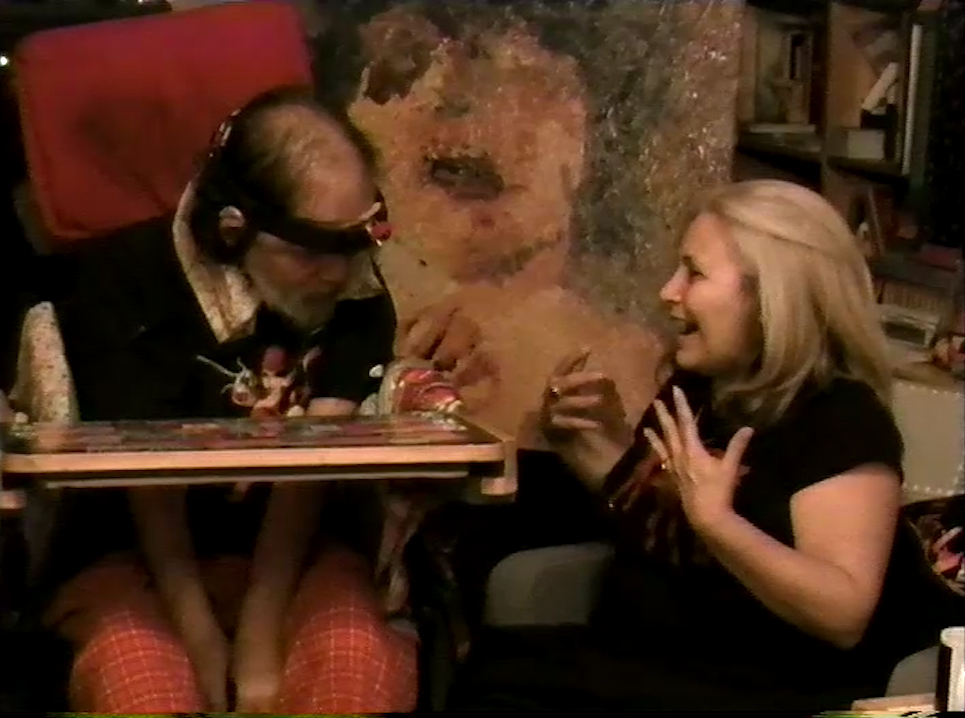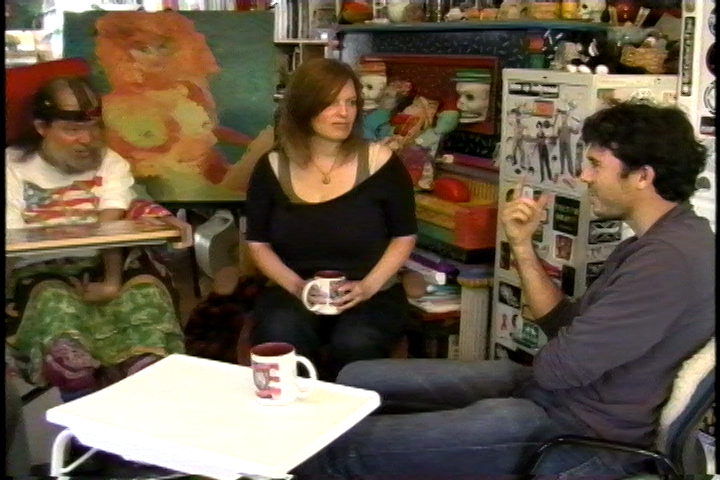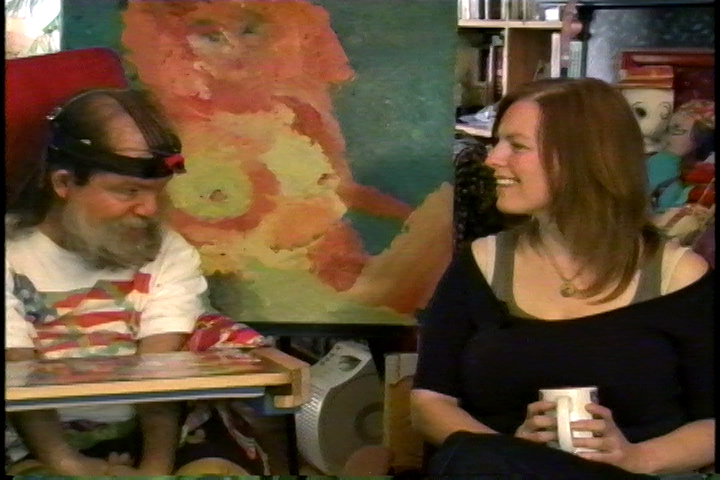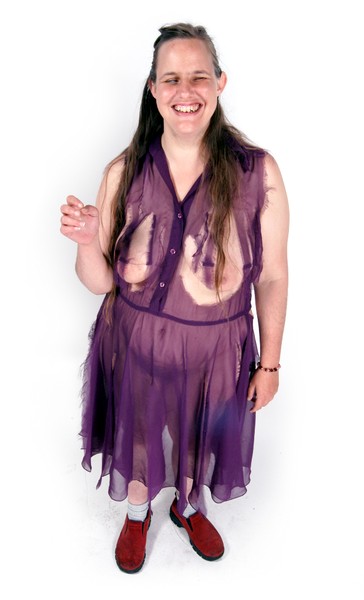Recorded March 8, 2009 on luver.com
In Frank’s own words, “Penny is funny, warm, sexy, erotic, kick-ass, political, subversive, plain talking, nude, up-lifting, real, wise, entertaining, committed, outsider, humane, community-building, rich history … and a damn good artist!”
Penny had just finished a performance of her BITCH! DYKE! FAGHAG! WHORE! in San Francisco and was immediately taxied off to Berkeley by a couple of Frank’s students. This was also the second session of the night for Frank who had just completed an hour and a half interview with another guest shortly before Penny arrived. When Frank announced the show, he said that they would be “comparing notes from our lifetimes of cultural subversion!”
Penny Arcade’s transformative experimental performance work has been produced all over the world. Like Frank, her resume is rich good reading, and takes you on an amazing journey from leaving home at age 14 to “join the fabulously disenfranchised world of queers, junkies, whores, stars, deviants and geniuses”, through Andy Warhol’s Superstar Factory, into the European political theater of the 1970s, her art experiments and activism of the 1980s, prolific theatrical productions of the 1990s, and her growing international performance work since 2000. And like Frank, she (with Steve Zehentner) has produced a long-running public access TV show, planting seeds and exposing mainstream culture to the real art and history. This show, Stemming The Tide of Cultural Amnesia, The Lower Eastside Biography Project, actually featured the interview below, so it has been seen many times on both coasts.
This interview is “shop talk” between two legendary artists, and a primer for any artist just setting out on the road of art and the experimental life.
Below is an excerpt from the book, Deep Conversations in the Shaman’s Den, Volume 1.
Linda: (in mid-sentence) … we play it as a repeat all night, so a new episode plays at like one in the morning, because we have like, almost 400 episodes.
Penny: Wow. That’s crazy, I love it!
Linda: We’ve been doing it like ten years.
Penny: Yeah, and we’ve been doing ours about ten years. So, it’s kind of interesting that we’re on the same (gestures) …
Linda: Yeah. Got into cable at the same time.
Frank: I just asked for a 2½ hour time slot.
Linda: Because they didn’t have that as an option, but he said, I’d like to do 2½ hours and they said OK. But I think in Berkeley they don’t have a lot of people that are doing shows. It’s not like very competitive.
Penny: In New York it’s really … everything’s a half hour. You know, maybe sometimes you could do an hour special, but I love it!
Frank: How do you fit life into a half hour?
Penny: Yeah, exactly! Total bullshit! But, one of the things that was the most fucking interesting thing was when I went to get that piece of pizza. And I had the books, right? So, I’m waiting for the pizza, and I started to read the NYU lecture [Frank’s Art Of A Shaman – Ed.]. And I’m a fast reader. I’m the highest comprehensive reader in my … when I was 12 years old in my age group in the state of Connecticut. So I’m reading and then my eyes fell on this whole … you and I have to talk, of course a lot about the commodification of art, right? And I was talking with the boyz (Corey and Alexi) about … I’m like totally an emerging arts fighter. I hate the whole concept of emerging arts, it drives me insane.

Frank: If art is not emerging, it is not art.
Penny: Yeah, but there’s a big difference between suddenly saying, after a thousand years, where there were young artists who became old artists and now they have this … the idea of emerging arts as a class of young people.
Frank: Yes.
Penny: This comes not from the art world. This comes from academia, because parents who are paying 250 fucking thousand dollars to educate their kids to be a performance artist, or a spoken word artist, or an experimental filmmaker, the same amount of money that it costs to educate somebody to be a lawyer (Frank sounds) or a surgeon. The parents want to be assured that there is an entry-level position for their kids. And this is terrible for young people because young artists, there’s no two ways. Jack Smith said, you have to apprentice, it’s the only way to learn how to make art! And not that people shouldn’t also do their own thing, you know.
Frank: Or just do it for years.
Penny: Yeah, absolutely! But you have to be willing to be bad for twenty years in order to be good.
Frank: Yes.
Penny: I was talking to the boyz and I was saying what they’ve been doing with this emerging arts thing is creating this professionalization of art. And art is not a profession. Art is a vocation. And I was reading in your …
Linda: Art Of A Shaman?
Penny: … Art Of A Shaman. And I was reading this part where you were talking about what they did with performance, into making it into a certain amount of time. Many, many people said about my show … I invite anybody, you know … and they say, I didn’t know it was going to be so long. (Linda laughing, Frank sounds) And that’s not one of my long shows. (Frank sounds, Linda laughing)
Frank: Exactly! They think that 45 minutes is a long show.
Penny: Right.
Frank: And I do 48-hour performances! (Frank sounds)
Penny: Yeah, yeah, of course. That’s because you’re a master. You’re a master. But it’s so … it’s very empowering for me, because I was very, very tired. I was very sick the whole week. From the first night you came to the Thursday night you came, I was sick that whole week with very bad bronchitis. And I had hepatitis C a few years ago and I went on the interferon treatment and then I got an auto-immune illness called sarcoidosis that settled in my lungs. So it made me weak in my lungs. So when I get bronchitis, which I seem to get now every time I get a cold, I had no energy. So all those shows I’m doing with no energy, which is very hard, you know. And so I was worried about the length. You know what I mean, myself. I was going, fuck, I don’t have the energy to … like, usually the opening of the show when I introduce the dancers, that’s like an assault. (Frank sounds)
Frank: Like a wrestling announcer!
Penny: Yeah, yeah, yeah, yeah!! Like a wrestling announcer, exactly! It’s a very dynamic fighting, very aggressive, you know. And I didn’t have quite that much energy, so I was like pushing it uphill all the way. It was very hard for me. So that night when I went to get the pizza then you gave me the book, I was looking at it. And then I read that thing about what they’ve done with performance. I think you and I are in agreement about a lot of things. For instance, I always say that performance only happens in the performance, right? It doesn’t happen … you don’t rehearse performance art. You know what I mean, that’s kind of (laughing and gestures) …
Frank: Or the rehearsal is a performance!
Penny: Yes, absolutely! Perfect! No problem! So then when I was reading it and I fell on these lines where you were talking about how they’ve taken performance and tried to fit it into this kind of entertainment category, etc., and then if you don’t do that, then you’re sloppy or you’re bad or you’re unprofessional or whatever. And my eyes fell on that, and I’m like, oh my God, I was just getting seduced down this road. You know, getting twisted up and feeling bad about myself. And then the other thing was, and also, of course, the most exciting thing that I read at that moment was about how the show goes where the show’s going to go. The performance goes where the performance is going to go. (Frank sounds)
Frank: You don’t control it.
Penny: No, no, no! It has to go where it’s going to go! And the thing is all my work is created improvisationally. And this show is the result of pretty much two years of straight improvisation. And then eventually it becomes kind of a set piece because it was … my mind works a little like an old time word processor. I kind of scan, and then I cut and paste in my own head as I go along. I think this is something you understand.
Frank: Me too.
Penny: Yeah, yeah, yeah, yeah. I think, I was getting this. I was reading this shit and I was thinking maybe Frank Moore and I are the same person! (laughter)
Frank: Or mates.
Penny: Yes, yes, definitely, for sure. But we even possibly could be the same person! Why couldn’t there be a sharing of almost persona, or something that we don’t even know exactly what it is.
Frank: I could do your show.
Penny: Yeah, yeah, yeah, exactly. I could do yours! I love it!

Linda: He did that. There’s a picture up there (gestures) of Frank dressed as Elvis Presley.
Penny: Oh yeah.
Linda: And he did that with an artist who was popular around here that called himself Extreme Elvis.
Penny: Oh yeah.
Linda: He was a big guy and he came out as the big Elvis. That was his outfit. And he’d end up naked real fast. Then he did the peeing and pooping on the audience stuff and just all this going out to the audience and trying to get them to be there with him. And they were mutually admiring each other. So he came up with the idea. He had this big date booked in a club in Oakland. He said, how about you be me? But we won’t tell anybody. He didn’t tell his band. He told one of his backup singers, that’s all. And he played Frank in the audience.
Penny: Wow!
Linda: And so the backup singer wheels Frank in. And the place was packed. (Frank sounds) He’s this hot act. And the band, because they know he’s always pulling fast ones, they just kind of go along with it. Oh, OK! And Frank does the whole show as him.
Penny: You have video of that?
Linda: Oh yeah!
Penny: Wow, that sounds so fantastic!
Frank: Freaked the punks out.
Linda: Well, they started … do you mean when the band had to come to your rescue? No.
Mikee: Gilman Street.
Linda: Oh wow! So what we did was, there’s this little all-age punk club down the street, that’s been around forever. And they were having this video festival and they contacted us out of the blue. We’re not really involved with them. And said to Frank, could you submit something for us to play at this festival. So we had just done this show, and they needed like 15 minutes or something. So he said cut out the 15 minutes where the backup singer pees on me. So we play that. And they’re these hardcore baby punks. And they freaked out. Why did they freak out? Because they thought that Frank was not there of his own free will. That he was being forced to be peed on and all this kind of stuff. Which Frank was not! That was the controversy!
Penny: It never ends. The political correctness never ends. Yeah, it’s funny, because you’re reminding me of … a number of years ago, I guess it was around 1991, I got a call from Ron Delsener who is the big rock’n’roll promoter in New York City, from his office. And they said that this band … now what the hell was the band’s name … I can’t believe I’m not going to remember the name of the band … the band is like, they’re the superstars of industrial music … Pig Head? Pig something. And it was like a guy from the Ministry, guys from out here, from the Ministry or whatever it’s called … it was a super hardcore industrial band. It was all the stars of all the different bands. Like a five-star band, they’re the super band! And apparently they had requested me. So I go down there, and I’m talking to the guy on the phone from the office. And I said, you know, I don’t think so. I said, the audience for this is like 16- to 24-year old guys. I said, I work with like … you know at that time I was doing a lot of work on rape and sexual abuse and shit like this and I say, my work is about rape and sexual abuse. I said I have like six erotic dancer girls. And I went, and yeah! I think, yes, I should do this! (laughing) The guy’s like, huh?! Well, I go there and I start doing this piece. And there’s like, I don’t know, 400 hardcore boys on the floor and I’m starting this piece and it was some piece about sex. It was a sexual piece. And the girls are grinding and dancing. (Frank sounds) And the boys just kept looking at the ground, you know. And then pretty soon it starts to look like oatmeal, like they’re getting annoyed! They wouldn’t look up, and it was bubbling like this (gestures). A guy at this point comes running up to me and goes, (screaming) we don’t want to hear any more of your sex stories!!! I had the mic and I was like, oooohhh. Is it true what they say about hardcore boys? Is it true what they say about hardcore boys? And it became really, totally … it was like really intense. And I was just going. And I just didn’t stop. And I started talking about that there was a smell of new age order. Of the new world order was in the room. And I just kept going on and more and more. And they were like freaking out. (laughter) And I looked up and there was a guy who was the roadie for the band. And I yelled, I said, hey, how long do I have to perform to get paid? And the guy goes, 20 minutes. So I said, OK. I ended up on one of the amps in the front and I started talking to them, very quietly. And I said, well, Pig Face, that’s the name of the band, well, I said, it’s kind of a weird situation. I’ve got to perform for 20 minutes in order to get paid. I know you guys don’t want to see me. And you don’t want to hear anything that I’m doing. I said, even though Pig Face wants you to see me. That’s why I’m here. And I went on. I did this whole long, very quietly emotional thing. And then I looked up and I said, how much time do I have left? He goes, you just did 20 minutes. And I went, bye! (laughter) And we all walked off the stage. And then I went upstairs and the guy from Pig Face, the main singer, he’s this little English guy. He’s quite famous, blonde guy. And I said, hey, your audience are assholes. And he goes, yeah, I know. And he’s doing push-ups. I said, are you doing push-ups to be pumped when you go on stage? He’s doing push-ups and he goes, no! It makes the acid come on faster! And then I watched him, and they were like … their whole show was these young guys trying to get on stage and them beating them with their guitar and bass. It was like the mosh pit scene, you know. And then afterwards we were … I was upstairs and all these guys kept coming over and going wow, you’re way more hardcore than Pig Face! And you’re more hardcore than anybody!

DOWNLOAD THE COMPLETE INTERVIEW HERE (PDF)
Recorded March 8, 2009, Berkeley, California. This is an episode of my live internet streaming video show, THE SHAMAN’S DEN, on my internet station, www.luver.com. On this Penny Arcade and I talked deeply about how to cause trouble in the underground as misfit performance artists as a lifetime calling and have fun doing it!



